|
|
|
Sort Order |
|
|
|
Items / Page
|
|
|
|
|
|
|
| Srl | Item |
| 1 |
ID:
134341
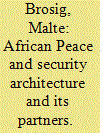

|
|
|
|
|
| Summary/Abstract |
This article presents survey data on the African Peace and Security Architecture (APSA). It focuses explicitly on two aspects: the internal constitution and achievements of the APSA; and coordination and cooperation with external actors, such as Regional Economic Communities, the United Nations and the European Union. The survey, conducted between October 2011 and December 2012, targeted 198 security experts in international organisations, think tanks, academia and non-governmental organisations. It reveals the APSA's current stage of development, achievements and challenges.
|
|
|
|
|
|
|
|
|
|
|
|
|
|
|
|
| 2 |
ID:
137736
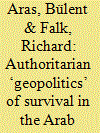

|
|
|
|
|
| Summary/Abstract |
The Arab Spring has shaken not only the state and society dimension in the countries of the MENA region but also the power of authoritarian leaders that had been ensured for a long period of time. This paper takes a critical look at the issue of how authoritarian regimes reacted to the new political atmosphere produced by the Arab Spring. More specifically it attempts to identify how geopolitical reasoning influenced the formulation of new strategies designed to promote the survival of authoritarian regimes. It focuses upon the geopolitical reasoning relied upon by Iran and Saudi Arabia, which included creating threat-enemy chains in domestic politics, shifting alliances in regional policy and taking advantage of relations with external actors to gain support for authoritarian rule at home
|
|
|
|
|
|
|
|
|
|
|
|
|
|
|
|
| 3 |
ID:
116892


|
|
|
|
|
| Publication |
2012.
|
| Summary/Abstract |
It has become common to regard consociational democracy as a method of managing conflict in ethnically divided societies but little attention has been paid to its applicability to societies where the primary political cleavage is between secular and religious forces. This article seeks to redress this imbalance by examining the applicability of consociationalism to the case of the Palestinian Territory. We argue that, while Palestinian society is characterised by 'pillarisation' along a secularist/Islamist cleavage, formal power-sharing between the representatives of the two main Palestinian factions, namely Fatah and Hamas, has proved elusive. However, rather than seeking to explain the seeming inability of the factions to share power by reference to the nature of the cleavage, as other authors have done, we instead highlight the contextual factors that have made power sharing difficult to achieve, namely the difficulties Hamas and Fatah face in accepting each other as political partners, and opposition from external actors.
|
|
|
|
|
|
|
|
|
|
|
|
|
|
|
|
| 4 |
ID:
167403
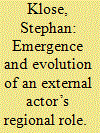

|
|
|
|
|
| Summary/Abstract |
The regional roles external actors play, such as ‘China’s role in Africa’ or ‘the US role in East Asia’, have long been popular subjects of analysis in the international relations literature. Yet, the emergence and evolution of these roles remains remarkably under-theorized. While some ‘new regionalist’ scholars have discussed the dynamics of an external actor’s regional involvement by referring to the concepts of ‘penetration’ and ‘socialization’, neither concept, this article argues, is sufficiently equipped to capture how external actors come to aspire and realize their regional roles. To address this shortcoming, the article employs an interactionist role theory perspective, which draws on the work of social psychologist George Herbert Mead. In following this perspective, the article argues that external actors develop regional role aspirations as they draw on their creativity and reflexivity to overcome experienced uncertainties. To realize these aspirations, the article suggests, external actors seek to cast significant others into corresponding roles. Alter-casting, the article argues in this context, is critical for understanding the (re)constitution of an external actor’s regional role, and thus a region’s social structure.
|
|
|
|
|
|
|
|
|
|
|
|
|
|
|
|
| 5 |
ID:
160958
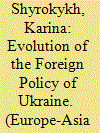

|
|
|
|
|
| Summary/Abstract |
By focusing on the role of, and interplay between, external actors and domestic factors, the present essay explores the evolution of Ukraine’s foreign policy. It argues that this policy has been shaped to a significant degree by positive and negative externalities, being a response to domestic developments as well as external challenges and opportunities. Acknowledging the importance of cost–benefit calculations by domestic actors, the essay does furthermore explore the role of norms and values in forming Ukraine’s foreign policy preferences.
|
|
|
|
|
|
|
|
|
|
|
|
|
|
|
|
| 6 |
ID:
095564


|
|
|
|
|
| Publication |
2010.
|
| Summary/Abstract |
Cambodia has been governed by the same, relatively fixed, elite since the Vietnamese removal of the Khmer Rouge from power in early 1979. This article provides an analysis of the dynamic interplay of external and internal factors that have contributed to the perpetuation of this elite's rule in the context of a nominal political and economic transition that might have been expected to undermine the bases of their power. It is argued that the patrimonialism of the Cambodian state and the provision of material aid and political legitimacy by external actors have been central to the endurance of this ruling elite.
|
|
|
|
|
|
|
|
|
|
|
|
|
|
|
|
| 7 |
ID:
190360
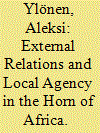

|
|
|
|
|
| Summary/Abstract |
Strategic and security analysis of the Horn of Africa systematically portrays the roots of instability as external. However, the region’s stability or instability is largely determined by local actors and conditions. Local agency and context largely set the conditions for the involvement of external actors. This article discusses how state and nonstate actors have conducted their engagement with outside powers, especially the Gulf states, at a time of increasing rivalry for influence in the Horn of Africa, with examples ranging from Ethiopia to Somalia, and from Djibouti to Somaliland.
|
|
|
|
|
|
|
|
|
|
|
|
|
|
|
|
| 8 |
ID:
160951
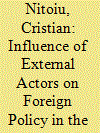

|
|
|
| 9 |
ID:
162434
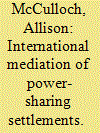

|
|
|
|
|
| Summary/Abstract |
Power sharing is largely accepted among scholars and policy-makers as a potentially effective mechanism for building peace in the aftermath of violent ethnic conflicts and self-determination disputes. Although the operation of power sharing may be prone to ongoing challenges and even political crises arising from the legacy of the conflict, international actors continue to promote power-sharing arrangements to manage self-determination and other ethnopolitical conflicts. This article investigates the normative and instrumental reasons why third-party mediators (on behalf of international organizations and/or states) turn to power-sharing strategies during peace negotiations. It considers the reasons why third-party mediators promote power sharing when its maintenance is likely to depend on their ongoing commitment and governance involvement. We argue that mediators draw from four different perspectives in their support of power-sharing settlements: international law, regional and internal security, democracy and minority rights, and a technical approach where mediators focus on the mechanics of power-sharing designs. The article draws on in-depth semi-structured interviews with officials from the United Nations and the European Union working for the organizations’ respective mediation units as well as documentary analysis of official mediation documents.
|
|
|
|
|
|
|
|
|
|
|
|
|
|
|
|
| 10 |
ID:
127483
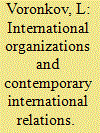

|
|
|
|
|
| Publication |
2013.
|
| Summary/Abstract |
SOVEREIGN STATES traditionally build their relationships with external actors and partners in the interest of creating a favorable international environment for the effective achievement of national goals. The foreign policy of states performs a very important, but mainly an auxiliary function in dealing with their internal problems.
In recent decades, due to the growing interdependence of modern states, the internationalization of their life and the deepening of globalization processes, the significance of international factors for successfully dealing with national matters of individual states has increased markedly. International and domestic aspects of their policies are becoming more organically interlinked. This induces states to look for ways to raise their role in shaping a favorable international environment for national development.
|
|
|
|
|
|
|
|
|
|
|
|
|
|
|
|
| 11 |
ID:
163760
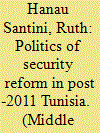

|
|
|
|
|
| Summary/Abstract |
In post—2011 Tunisia, the reform of the security sector has proceeded haphazardly, hindering security efficiency and lowering the overall effectiveness in countering threats. Since 2015, the combination of three factors — external shocks, international actors' pressures and domestic configurations of political power — have paved the way for a progressive overhaul of the efficiency of security agencies. Following the 2015 terrorist attacks, that destabilized the political system and risked derailing the trajectory of democratic consolidation, European powers exerted pressure to improve efficiency in the security sector. Lastly, these push factors needed an enabling condition, a strong presidency of the republic, to make the changes happen. The measures adopted reflect a technical and supposedly depoliticized view of reforms, in line with a broader post‐interventionist trend in Security Assistance. Based on process-tracing, the analysis of primary documents and several in‐depth interviews carried out between 2015 and 2017, the article illustrates the workings of the policy process in the security arena. It sheds light on the conditions that made possible the adoption of reforms, the role external actors played in pushing for change and in creating a new multilateral mechanism, the G7+, which produced an unintended set of domestic consequences.
|
|
|
|
|
|
|
|
|
|
|
|
|
|
|
|
| 12 |
ID:
152084
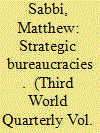

|
|
|
|
|
| Summary/Abstract |
The influence wielded by international development actors in Global South bureaucracies remains enormous. These actors actively shape the policy-making practices and funding of local state bureaucracies. Nevertheless, local bureaucracies have become adept at strategically appropriating that influence to their own benefit and to appear legitimate in order to exact development funds for their everyday tasks. Empirical data from two local self-governing areas in Ghana show that attempts towards gaining legitimacy are not only influenced by self-interest but also by external development funds seeking to promote the performance of the local state. Despite numerous institutional changes to enhance participation, the daily tasks of the local political structures tend rather to focus on assessments and qualification for development funds. Although these funds add to the local resource pool, at the same time they inhibit the realisation of the local state’s grandiose promise of reforms promoting participatory development.
|
|
|
|
|
|
|
|
|
|
|
|
|
|
|
|
|
|
|
|
|